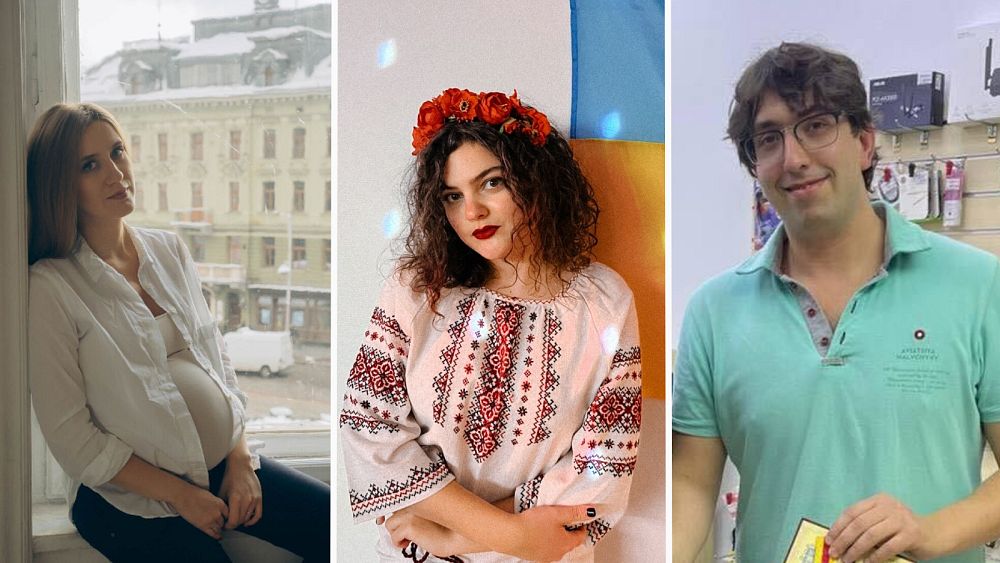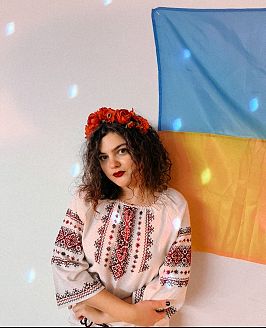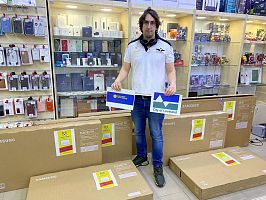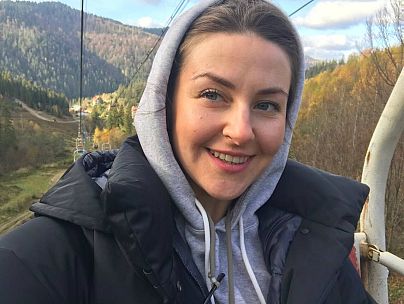
This time last year, Svitlana Maistruk was fleeing Ukraine in a hurry, travelling across the country to get to Poland.
When Euronews spoke with her then, she described herself as being completely “lost and devastated” but was thankful that with friends, they had devised a plan to flee.
A year later, Svitlana has returned home and lives with her husband and new baby in western Ukraine.
Though she misses her city Kyiv, they have adjusted to their new life in the west and feel safe and thankful to be back.
“It was very complicated emotionally to be far from my family and far from my husband,” she says.
“I couldn’t bear that for more than four months and I found out that I was pregnant and we decided with my husband that it would be better for us to be in Ukraine and to be together.”
Svitlana and her husband decided to stay in Lviv in western Ukraine, saying that the risk would be greater in Kyiv. She misses her friends but has become used to the changes in her life.
“We got used to living without electricity, Ukrainians got used to hardships, we just find different ways to live without it,” she says.
They have backups for water and electricity in case Russia attacks infrastructure as it has throughout the country.
“Unfortunately it’s a new normal for Ukraine.”
‘Air raids sound normal like a phone call’
Like Svitlana, 24-year-old Vasilisa Chumachenko in Odesa says it’s important for her to be near her family in Ukraine.

When Russia launched the war last year, she was initially terrified for her loved ones, especially those closer to the frontlines. But she chose to stay in Ukraine despite the fear and uncertainty.
“I didn’t move abroad, I didn’t become a refugee because I have family here, I have friends, I have work here. My whole life actually is here, it’s my home,” she adds.
After a few months, Vasilisa began to get used to the frightening news coming from the regions around Kyiv, where there was evidence of mass graves with civilians killed by Russian forces. Hearing what was happening across the country became part of her “new reality”.
She used to feel scared when she heard the air raids warning about a possible missile but now, it feels different.
“Now you just hear it, it sounds like a phone call for you. It’s like, you know, it’s like a missile flying over the sky somewhere. And you know you probably can die right now. But it became like a part of something normal,” she says.
Vasilisa says that if she were speaking to herself last year, she can’t believe she would be saying this today.
“But after a year of living in this reality, I can definitely say that human beings can get used to anything in life,” she said.
“I didn’t even know we could be so brave.”

Her friend Olexander Krasnov is also in Odesa and has been using his tech experience to supply computer equipment to Ukraine’s armed forces.
“I feel I’m in the right place because I feel I can help here. I feel that I can also help the economy here,” he says.
He buys from local businesses to help the Ukrainian economy, which contracted 30% last year due to the war.
But “are you safe” has become a hard question to answer, he says, adding that no air defence can protect 100% against rockets.
In Kyiv, a capital city changed
Khrystyna Brodych, a 33-year-old NGO worker, returned to Ukraine’s capital Kyiv for the first time after Russian forces retreated from the region last April.

“There was fear in the air, feeling that something is not ok but still it was very nice to be back home,” she says.
But it wasn’t until that autumn that she first heard a missile strike close to her home.
At that moment she had already felt safe in Kyiv but both the autumn and last month were very difficult.
“There were regular attacks from the air, missiles were (hitting) infrastructure and that was very hard on both physical and mental health,” she says, adding that in addition to short winter days there were long bouts without electricity.
On top of that many of her friends have fled the city, especially those with kids, with some building new lives in Europe, the US and Canada.
Vasilisa Chumachenko
Hope for the future
Khrystyna says the sun was shining in Kyiv when she recently ran errands and that she believes it’s going to be fine even if there are routine alarms and threats.
“I’m hopeful about our future. I want to see it as bright as today,” she says.
In Odesa, Vasilisa has been volunteering with families coming from occupied areas of the country and from the eastern regions where there’s constant fighting.
As part of her volunteer work, she helps to teach children basic professions in the hopes that they can move abroad or better integrate into European society later on.
“These children (are) our future generation which we should (teach) how to live in a European society right now,” she says.

